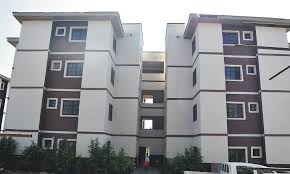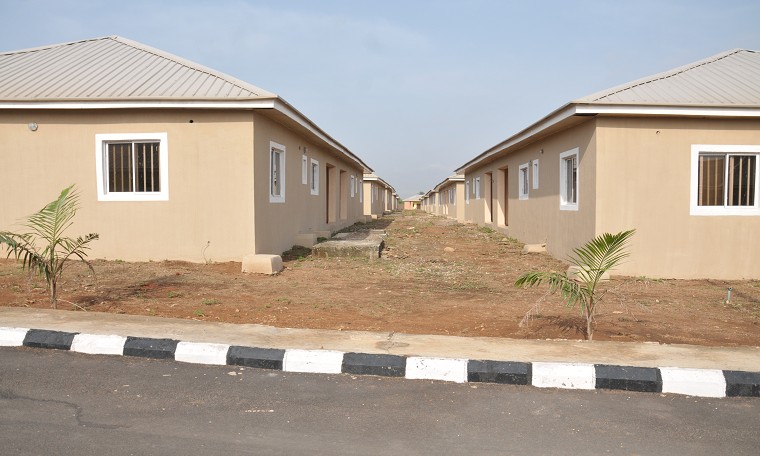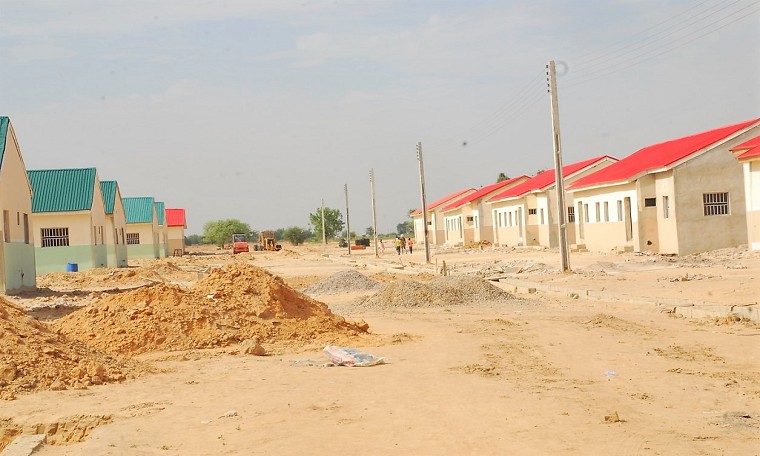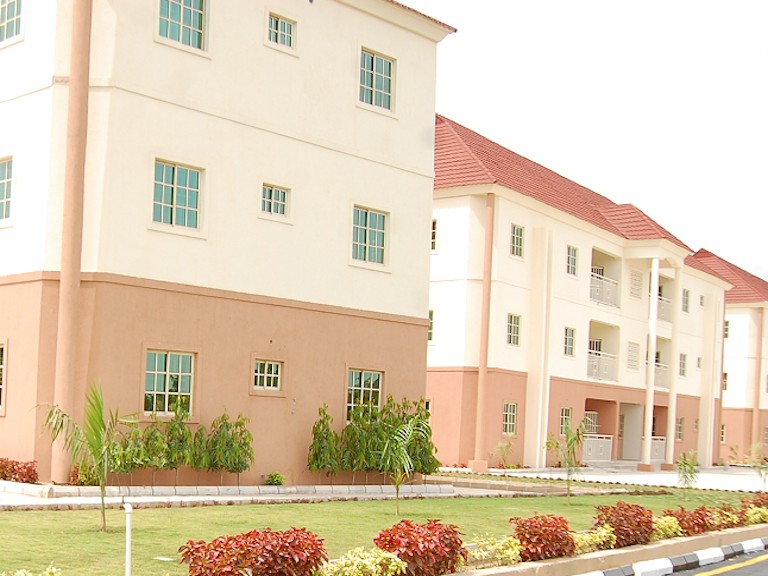- Arch. Ahmed Musa Dangiwa
By Ibrahim Dan-Halilu, Garba Dangida, Ambrose Inua Sule & Chris Alochie,

In this exclusive interview with the team of THE EXECUTIVES Editors led by Ibrahim Dan Halilu, the Managing Director/Chief Executive Officer of the Federal Mortgage Bank of Nigeria (FMBN), Arch. Ahmed Musa Dangiwa, an architect of over 20 years and fellow of the Nigerian Institute of Architects, Chartered Institute of Bankers of Nigeria, and Institute of Corporate Executives of Nigeria, and recipient of 30 awards of recognition and meritorious service to Nigeria and his profession, architecture. He unveils the transformation his tenure has brought to the apex mortgage institution in Nigeria which is unprecedented in the history of mortgage banking in Nigeria. He not only brought his over twenty years of professional work experience in mortgage banking, architecture and construction consultancy to bear on his new role but has been in the frontlines to transform the bank’s operation into a digital model that promotes efficiency, transparency, and accountability in delivering the FMBN s products to its key targets – lower and middle income earner
Many Nigerians believe that Mortgage banking in Nigeria caters for the needs of only the upper class. They believe that it has not impacted on their lives because the FMBN does not reach out to them. What is your response to this perception?
Like you rightly said, mortgage banking has not impacted on the people positively or in the economy in the sense that most of the mortgages created by commercial banks in Nigeria do not match the needs of the lower class. Mortgage is a long financing sourced by individuals to buy their own houses and pay back over time. But you find that commercial banks in Nigeria can only give you mortgage loans for a maximum of five years, which is not convenient for any low income earner to pay back. That is why in the 1970s the federal government created the Federal Mortgage Bank of Nigeria purposely at that time for the low and middle income earners to access mortgage at an affordable rate over a long period of time.
In 1992 the National Housing Fund Scheme (NHF) came into effect through an Act of the National Assembly, to provide long term funding for mortgages to Nigerian workers. The NHF scheme is a pool of funds sourced from 2.5% contribution from civil servants’ monthly salaries. The purpose is to provide affordable housing mortgage for Nigerians. This ensures that Nigerians can get mortgage loans at a single digit rate (6-7%) over a maximum period of 30 years, unlike in commercial banks where you get mortgage loans as high as 24-30% over a short period of 5 years.

ARCH. AHMED MUSA DANGIWA’S FIVE YEARS SCORE CARD
1. Recorded increase in NHF collections from N232.8BN (being total collections from NHF inception in 1992 to April 2017) to N495.8BN as of September 2021.
2. Over 300% increase in NHF refunds to retired workers from N10.8billion to N48billion.
3. 100% increase in housing loan disbursement from N152 billion to 314billion.
4. 51% increase in Housing Stock Development from 20,435 to 32,018.
5. Made Housing Products More Affordable.
6. Developed New Affordable Housing Products for Low Income Contributors to NHF.
7. Revamping of FMBN Legacy Housing Products.
8. Digitalization of FMBN Operations.
9. Developed a Five-Year FMBN 4 Strategic Turnaround Blueprint.
The NHF contribution is refundable with an interest. You will be refunded your contribution if you couldn’t access the loan, and even if you did access the loan, you will still be refunded your contribution after you clear your loan.
Over the years, people have complained that they didn’t have much information about the mortgage loans from FMBN, but under my administration, we have been sensitizing Nigerians via radio, television, and other print media across the country. Nigerians now understand that NHF exist, and it is no more only for the public servants. It’s for all Nigerians both in the formal and informal sectors, especially those in the low and middle classes.
What are the major Challenges you met when you assumed office?
Well, there were numerous challenges as at the time I took over as the Managing Director. The records of contribution showed that only 4.3 million Nigerian workers were contributing to the NHF. This is too low considering that there are over 80 million Nigerians in both formal and informal sectors. We had to enlighten people to understand that the NHF scheme wasn’t meant for only government workers, the informal sector should equally participate. And so we had to device a way to give them products that suit their status which they could leverage on to join the scheme.

We also met other issues like the refunds to contributors who contributed while they were working, and having retired they were finding it difficult to get their refunds. Unfortunately some have stayed many years without getting refunds because of some archaic nature in which the bank operated in the past.
Even the loan disbursement was taking a longer time with a lot of bottle necks before an individual could obtain a mortgage loan. As at the time I came on board, we discovered that for an individual to obtain a mortgage loan of 5 Million Naira, s/he had to pay 10% of the loan as equity stake. So how could such a person get 500,000 Naira to deposit before s/he gets 5 Million Naira loan? And any loan above 5 Million Naira, one had to deposit 30% of it as equity. So we had to find a way of reducing or removing that bottle neck. Even after reducing it, we still realized that there was still a low level of participation so we kept creating other means to encourage participation.
We also found out that the housing stock we had were basically built by private developers who put up a lot of overhead costs and profits, and so they come up with more expensive houses that were not affordable to the low and medium income earners who are our targets. So the bank had to find a way of giving single digit interest loans to individuals to construct their own houses by themselves, and also to estate developers to develop more affordable houses for the low and middle income earners.
What are some of the strategy you put in place to address the high cost of housing and double digit mortgage rates?
The first thing I did when I assumed office was to develop a five year strategic plan, to properly reposition the bank and outline the work ahead of us. All commercial banks in Nigeria have gone digital, so we also needed to digitalize our own system which we have started to do.

What can you describe as your major achievements as the Managing Director of the Federal Mortgage Bank of Nigeria?
We have raised the total National Housing Fund (NHF) scheme collections from N232.8 billion (being total from NHF inception in 1992 to April 2017) to 495.8 billion as of September 2021, which means within the past four years of my administration, we have collected a total of N263 billion, which is an increase of 115% over the previous years. We were able to achieve that by convincing more state governors to resume their state’s contribution to the National Housing Fund scheme so that their workers can benefit from the scheme, and to ensure the participation of their local government areas too.
We have expanded participation of the informal sector workers and self-employed citizens. We encourage cooperative societies to acquire houses for their members. We ensure transparency in management and administration of the National Housing Fund by digitizing our operations. We introduced new products and services to ease access to affordable housing, and we have staff welfare to boost productivity and efficiency.
We have increased the NHF refunds to retired workers by over 300%. As at the time I took over, the total refunds to workers who contributed to the NHF scheme was N10.8 billion. But between 2017 and 2021, we have refunded 37.2 billion, bringing the total refund so far to N48 billion, which means within the five years I have been in office, we have refunded contributors three times over what was refunded in the last 25 years since NHF was founded. And we were able to do so by decentralizing the refund process from the head office to state branches, thereby enabling the state branch offices to process and send qualified applications to the head office for payment.
We have increased housing loan disbursement by 100%. Within the 25 years of NHF establishment, a total sum of N152 billion have been disbursed. But within the 4 years we have been in office, we disbursed N162 billion, thereby increasing the loan disbursement rate by over 100%. This brings the total disbursed loan by FMBN so far to the tune of N314 billion.
We increased our housing stock development by 51%. Within the past four years we have been in office, we increased the total number of housing units constructed by FMBN from 20,435 to 32,018 as of September 2021. This means that in the past four years, we have built and delivered 11,585 housing units of affordable and quality homes to Nigerians.

We have made FMBN Housing products more affordable. As part of our efforts to unbundle the bureaucratic bottle necks in the system, we reviewed the terms and conditions for FMBN housing products, to make it easier, more accessible and affordable for Nigerians to own homes. We were able to achieve these through the following strategies.
1. Reduced the equity requirement for accessing mortgage loans from 10% to zero equity for mortgage loans below N5 million, and from 20-30% to 10% equity requirement for mortgage loans above N5 million.
2. Created Rent to Own (RTO) housing product that does not require equity, and reduced the interest rate from 9% to 7%.
3. Collaborated with the major labour unions to approach state governments for free land to fund affordable houses for Nigerian workers.
4. Revamped cooperative housing development loans for self-employed and informal sector to access construction finance to build houses for their members at 9.5% and created NHF or rent to own loans for them.
5. Created individual construction loans for NHF contributors to access loans and build their own houses.
6. Liberalized access to home renovation loans without any collateral, only guarantors are needed.
7. Increased repayment period for teachers, judges and lecturers to 65 years from 60 years as approved by Mr. President as their retirement ages.
8. Created NHF Diaspora mortgage loans for Nigerians in the Diaspora to access mortgages and acquire homes anywhere in Nigeria.
We have introduced digitalization of FMBN operations to make it more efficient, transparent, accountable, customer friendly and productive. We have launched FMBN Digital platforms – which ushered in a new era of transparency and accountability in the operations of the national housing fund by empowering contributors with real time access to information on their NHF accounts. The key components of the FMBN digital platform solutions suite of service include the following:
- The *219# USSD short code service via GSM mobile networks
- The NHF mobile apps available on android and IOS platforms
We have secured the federal government’s approval to deploy a core banking software application for the FMBN. Once operational, the application would help the FMBN to tackle the many systematic challenges that it has had to contend with over the years due to the largely manual nature of its operations.
What is your advice to Nigerians especially those in the lower and middle class bracket?
My advice to them is they should join the NHF scheme because that is the only surest way of owning a home once they join into the scheme. If they don’t come to NHF and join the scheme they are at liberty to go to commercial banks and get a mortgage of five years, at an interest rate of over 20%. But with the NHF they can even design their own home and can get a mortgage loan to build it.
Let them come to any FMBN state branch and register to start making contribution to the NHF, after six months they are qualified to apply for the mortgage loan to buy or build their own house. So we have to ensure there is efficiency, we have to improve transparency; we have to ensure we digitalize the office to make mortgage loans to be applied for online. That’s why we have developed our own core banking solutions to ensure that people can apply for the loans online.
While congratulating you on these wonderful achievements, could be this be the reason apart from political gladiators even local politicians from your home state are making frantic efforts to get you into the governorship race come 2023? Every nook and corner of the state you go, your posters and bill boards are becoming very visible. Could it be they have identified the golden fish that has no hiding place?
I have very little to say on that because its politics that brought me to this position I occupy. The person that gave me the position knows my worth because i have worked with him before. If he gives you assignment and you do it diligently that becomes an attraction. So probably the people want the same quality service to be given to them at the state level. That may be the reason they want me to come over and contest. And I won’t tell them No. But I want to make sure that the national assignment given to me by Mr. President I did it well and deliver.
Who is Architect Ahmed Musa Dangiwa? Our readers would like to know your profile.
My name is Architect Ahmed Musa Dangiwa, from Katsina State precisely in Kankia Local Government. I was born on 10th February 1963, and began my primary school in Katsina. I attended Sardauna Memorial College Kaduna for my secondary education, and Ahmadu Bello University (ABU), Zaria for my University education where I obtained my BSc and MSc degrees in Architecture from 1982-1987. And I served for my NYSC in Cross Rivers State.
I started my working career as a lecturer at the Hassan Usman Katsina Polytechnic, and after a very short while I moved to the Ministry of Health. It was our best time then as Katsina State was just created in 1988 when I finished my National Youth Service. So Architecture professionals were in dire need in the state at that time. I was able to secure two jobs within two months. All the same, I felt that I was not comfortable with those jobs. I had to move to Kaduna to start work with an architectural and development consultancy firm, Triad Associates. My own main goal that time was how do I improve my professional capacity to be a professional architect, and be registered to set up my own architectural consultancy firm to be a full consultant? So that’s why I moved there for six years. Within those six years, I was able to get all my professional qualifications, to the extent that I got my seal and registered my own architectural consultancy firm.
As I was about to start my own consultancy firm, an opportunity came to me through Alhaji Sani Zangon Daura and Alhaji Abba Musa Rimi, a former Governor of former Kaduna State, who engaged me as a mortgage banker for their newly established Sahel Mortgage Finance Limited. I joined the team as a Mortgage Manager. Within two years that I started work there I realized that I need to improve my qualification as an architect and now a mortgage banker. So within two months I enrolled in ABU Zaria to study for an MBA to get a business and accounting background in order to do my job well. I was able to get my MBA within three through par time studies. Immediately I got my MBA I left to set up my own architectural consultancy firm. I have been managing that for over 20 years before Mr. President appointed me as the Managing Director of the Federal Mortgage Bank of Nigeria in 2017.
FMBN HOUSING PRODUCTS
| SN | PRODUCT | TENOR | INTEREST RATE |
| 1 | NHF Mortgage Loan | 30 years | 6% |
| 2 | NHF Individual Construction Loan | 15 years | 7% |
| 3 | Rent To Own Scheme | 15 years | 9% |
| 4 | Home Renovation Loan | 5 years | 9% |
| 5 | Estate Development Laon | 24 years | 10% |
| 6 | Ministerial Pilot Housing Scheme | 24 years | 10% |
| 7 | Cooperative Housing Development Loan | 24 years | 10% |
| 8 | Off Taker Guarantee Scheme | 12 years | 1% |

+ There are no comments
Add yours